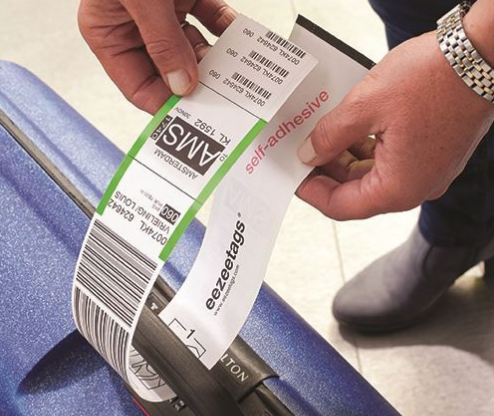
Self-Adhesive Bagtag Printers For Airline Check-In Kiosks
Read full article at Airport Improvement website Apr2020 — To accommodate the tags’ unique adhesive, Embross partnered with printer manufacturer Custom to add special rollers to its VelocityOne kiosks.
The ticketing lobby at Daniel K. Inouye International Airport (HNL) on the island of Honolulu was transformed late last year with fresh finishes and updated check-in kiosks that print a new breed of bag tags. Podium panels now feature custom graphics designed by a Maui tattoo artist.
The new self-service kiosks, 54 in all, allow passengers to check themselves in and print their own tags for checked baggage. But you won’t find backing paper from the tags strewn about the floor or overflowing from garbage cans. The new kiosks at HNL print self-adhesive bag tags designed to save time and reduce waste. A special adhesive sticks the two sides of each tag together, but does not stick to bags, floors or passengers’ fingers and clothes.
The kiosks and bag tags are part of a multimillion-dollar initiative launched last year by Hawaiian Airlines to renovate lobbies at five airports it serves. Updates have also been completed at Lihue Airport on the island of Kauai, Kahului Airport on Maui, and Hilo International Airport and Kona International Airport on the “big island” of Hawaii.
| facts&figures
Project: Terminal Lobby Renovations Locations: Daniel K. Inouye Int’l Airport, Honolulu; Lihue Airport, Kauai; Kahului Airport, Maui; Hilo Int’l & Kona Int’l Airport, Hawaii Funded By: Hawaiian Airlines Project Management/Design Architect at HNL: Landrum & Brown General Contractor: Hensel Phelps Kiosks: VelocityOne, by Embross. Bag Tag Printers by CustomAmerica Bag Tags: eezeetags, distributed in the U.S. by Gateway Business Communications Signage Construction & Installation: Blue Skies Global Podium Panel Design & Wall Motifs: Keone Nunes Digital Signage: CDW |
The renovation projects were spurred by the need to replace aging check-in kiosks; but the airline also took the opportunity to find new ways to improve the passenger experience.
“The kiosks were about 10 years old,” points out Randy Arnold, Hawaiian Airlines’ project manager. “They typically only last five years, but we pushed them to the limits because we wanted to make sure the lobby design for each airport was just right.”




